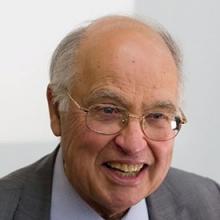Michael Francis Atiyah, one of the most significant mathematicians of the second half of the 20th century, passed away on 11th January 2019. His profound contributions to topology, geometry and mathematical physics earned him the highest mathematics honours, viz. the Fields Medal in 1966 and the Abel Prize in 2004, which he shared with Isadore Singer. His achievements are well summarised by the Abel Prize citation: “For discovery and proof of the index theorem, bringing together topology, geometry and analysis, and their outstanding role in building new bridges between mathematics and theoretical physics”.
His enthusiasm to intertwine mathematics and physics and in particular quantum physics and emphasise their symbiotic existence was infectious. An example of this, based in part by suggestions from Atiyah, is Witten’s application of Chern-Simons gauge theory to the theory of knots in 3-dimensional topology. String theory embodies this essential unity in a natural way.
Atiyah played an important role in the establishment of the ICTS. The committee he chaired that reviewed Mathematics at the Tata Institute of Fundamental Research (TIFR) in 2005 made a strong recommendation for an interactive program for physicists and mathematicians. This reinforced the recommendation of the Theoretical Physics review committee in 2006 to establish ICTS in 2007.
He strongly supported the idea of creating the ICTS and was a member of its International Advisory Board from inception till his passing away. His active involvement and advice has been encouraging and invaluable. Commenting on the structure of the ICTS in a letter to Spenta Wadia dated 14 February 2009 he said,
“I dislike rigid departmental boundaries. They have a habit of perpetuating old demarcations well beyond their "sell-by date".
As you know the most active scientific frontiers are those which cross boundaries. I hope the structure of your Institute will be flexible and adaptable.
In your tentative list of subject areas you allocate 6 faculty in mathematics. Given the widespread application of mathematics in the sciences I find this number quite small. On the other hand I imagine many of the other areas (e.g. string theory) will contain mathematically oriented scientists. So the exact allocation is not important, so long as flexibility and quality are maintained.
Finally, I totally agree that your initial appointments should be made cautiously and not in haste”.
He embraced the idea and purpose of the ICTS, which he put forth in his remarks for the Foundation Stone Ceremony of ICTS on 28 December 2009,
“Science has the noble aim of trying to understand the natural world in human terms: to make sense of what we see. This brief phrase encapsulates both theory and experiment. What we see, in the broad sense, covers experiment and making sense is the task of theory. As the great French mathematician Henri Poincare said, science is no more a collection of facts than a house is a collection of bricks: it requires theory to hold it together.
Theory needs a framework in which to develop and, as a mathematician, I believe that mathematics provides that unifying framework…
I am sure that mathematics, in all its various aspects, will play an important part in the future activities of this Center. In the complex modern world with the enormous challenges that we face, from climate change to energy, from poverty to water shortages, science provides the bedrock on which we can build our future. I am sure that this Center will play its part in guiding both India and the wider world in the years ahead.”
His remarks during the inauguration ceremony of the ICTS campus are worth remembering.
“…The fact that I had physics friends is an indication that the frontiers between disciplines were breaking down, and this has become the main feature of our times. The old rigid disciplines of the past are giving way to a much more fluid scene, which is why the ICTS is the right body for the future. The future belongs to the young and the science that is now emerging will affect the lives of everyone on the planet. The ICTS has a noble task, that of providing the right atmosphere to inspire the next generation of scientists…”
He will be remembered with fondness and gratitude by the institution he helped establish and strongly supported, and whose value and relevance he well understood.


